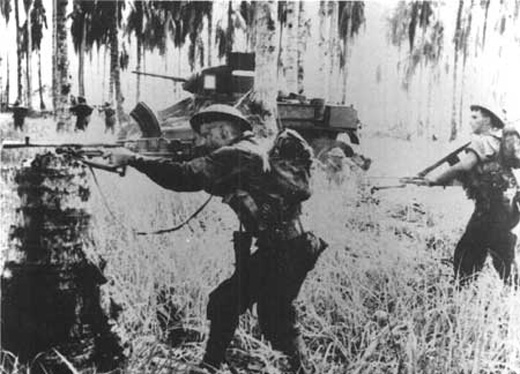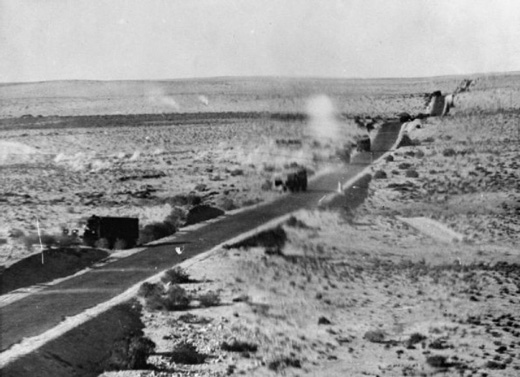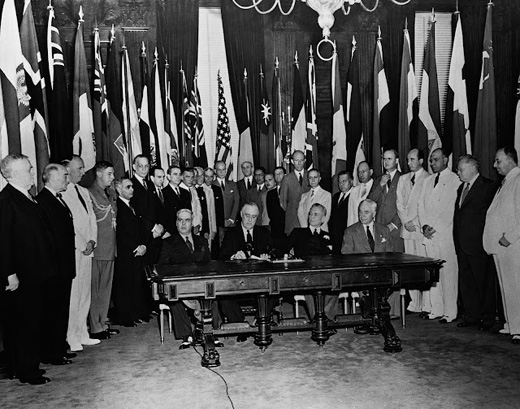Battle of the Atlantic
The British steamer Kentwood (2180t) is badly damaged by a mine near Haisboro. The ship later sinks being towed by a navy ship. The entire crew are rescued.
[Borneo
Sarawak is abandoned by the British after oil field facilities are destroyed.
[Britain, Home Front
In an explosion in a colliery in Burslem, Staffordshire, 58 miners are killed.
[China
The Chinese request lend-lease aid for construction of a road across north Burma to link with the Burma Road. The projected road would extend from Ledo, India to Fort Hertz, Myitkyina, and Lungling.
[Diplomatic Relations
The Chinese government asks for help under the Lend-Lease Act to build a road from Ledo in India to Lungling in China across northern Burma, creating a real 'Burma Road' to supply the Chinese forces.
[Dutch East Indies
The Japanese land on Labuan Island.
Australians Fighting Near Buna |
 |
Eastern Front
German forces mount a strong counterattack on the Russians that have penetrated into the peninsula near Kerch and Feodosiya in the Crimea. The attacks of the Kalinin Front retake Staritza, 48 km northeast of Rzhev, which has been destroyed by the Germans.
SOUTHERN SECTORTimoshenko unleashes his assault in the Ukraine. Planning to attack all along his sector, the Bryansk Front is to attack toward Kursk and Orel with the 3rd, 13th and 61st Armies in conjunction with the 21st ant 40th Armies on the northern wing of the Southwest Front. The Southwest Front is to attack with the 38th and 6th Armies in the Chuguyev-Balakleya-Izyum area to capture Kharkov and Krasnograd. The South Front, with the 57th, 37th and 9th Armies is to attack toward Pavlograd and seize Dnepropetrovsk and Zaporozhe. The 57th is to push through Barvenkovo to Pavlograd, while the 37th Army attacks toward Bolshoi Tokmak. The 51st and 44th Armies are to coninue their offensive in the Crimea.
The offensive begins at dawn, heavy fighting erupting along the Siem River as the 40th and 21st Armies launch vigorous attacks toward Oboyan and Kursk. The left wing of the 40th pushes 20 miles into the German positions, while the 21st Army cuts the Belgorod-Kursk road.
In the Crimea, the XLII Corps counterattacks but is unable to crush the Soviet bridgehead at Feodosia. The XLII is too weak to destroy the Soviet force.
[Malaya
The Japanese 25th Army under Gen Tomoyuki Yamashita continues its southerly advance. In the eastern sector Kuantan is taken by the Imperial Guards Division. In a brilliant amphibious operation the 5th and 18th Divisions outflank the 11th Indian Division, which is putting up a dogged resistance to the Japanese at Kampar northeast of Telok Anson, and along the road leading south to Kuala Lumpur and Singapore, and occupy Telok Anson. On the island of Singapore, Tengah airfield suffers its first heavy Japanese air raid.
[Malta
There are heavy raids by Axis aircraft on the island's airfields and ports.
[North Africa
In an effort to relieve the pressure being exerted by the British 8th Army, the Germans and Italians, who have consolidated near Agedabia, counterattack inland on the right flank.
A new assault on Bardia takes place by the 8th and 44th Royal Tanks from the 1st Army Tank Brigade, which has the 3rd and 4th South African Brigades under tactical command for the operation. After some preliminary moves during daylight, the armor launches a major attack after dark under cover of a heavy artillery bombardment. The attack is successful and at dawn 2 January the garrison surrenders.
German Transport Column Under Air Attack |
 |
Occupied France
In a broadcast Pétain requests for relaxation in the severity of German occupation policies.
[Pacific
- The American steamer Malama (3275t) is captured by Japanese armed merchant cruisers Aikoku Maru and Hokuku Maru southeast of the Cook Islands. The crew is interned at Shanghai.
- The Japanese army cargo ship Teiun Maru (1566t) sinks after hitting a Japanese mine off the mouth of Lingayen Gulf. 134 passengers and crew are lost.
Philippines
The American and Filipino forces on the island of Luzon continue to fight their way back toward the Bataan peninsula after blowing up the bridges across the Pampanga River. The Japanese move through Plaridel to Calumpit, but are unable to cross the Pampanga. Elements of the 71st and 91st PA Divisions withdraws from the river line toward San Fernando. Meanwhile, the 21st and 11th PA Divisions continue fighting withdrawals, the 21st along the route Bamban-Angeles-Poroc and the 11th on route Malagang-San Fernando-Guagua, arriving at what is now the main defense line, Porac-Guagua, during the night.
[United States, Home Front
In order to conserve steel, a ban is issued on the sale of new private passenger cars and trucks.
[World Affairs
The first step is taken toward the establishment of the United Nations when representatives of 26 countries meet in Washington to endorse the principles of the Atlantic Charter. The terms of the charter were drafted by Roosevelt and Churchill on Aug 14, 1941. The document reaffirms the principles that lie behind the struggle of the democratic countries ('to insure life, liberty, independence and religious freedom and to preserve the rights of man and justice'). They agree (1) to employ all their resources against the Axis powers and (2) to make no separate peace. The declaration is signed by the US, Great Britain, the Soviet Union, China, Australia, Belgium, Canada, Czechoslovakia, Costa Rica, Cuba, El Salvador, Greece, Guatemala, Haiti, Honduras, India, Luxembourg, the Netherlands, New Zealand, Nicaragua, Norway, Panama, Poland, Santo Domingo, South Africa and Yugoslavia. Any nation that will 'contribute materially to the struggle for the achievement of victory over Hitlerism' will be able to adhere to this 'open alliance'.
Signing the Declaration of the United Nations |
 |